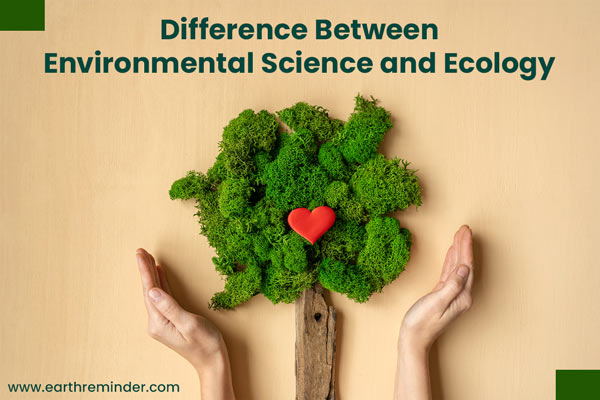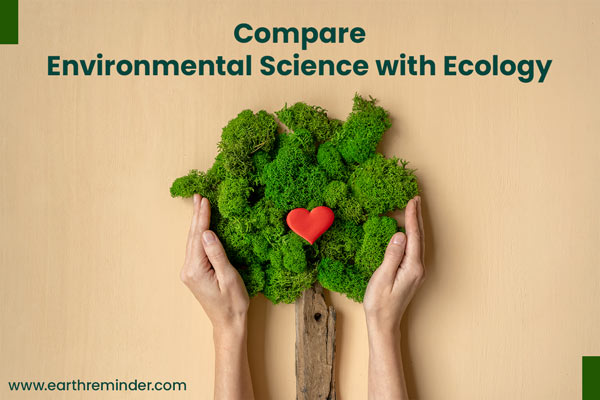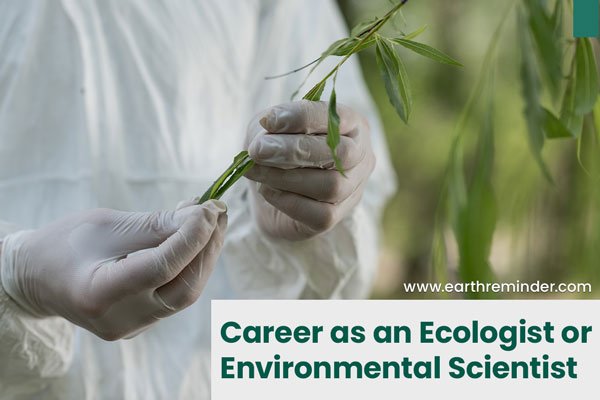What is the Difference Between Environmental Science and Ecology?
Difference Between Environmental Science and Ecology:
Many changes are observed on our planet, and humanity is mainly responsible for these changes. If an individual studies the environment and plants in environmental science and ecology, this can help in improving the surrounding environment. Ecology and environmental science are the studies that teach us about relationships between organisms and the environment and how we can work to save them.
Before knowing the difference between environmental science and ecology, let us try to understand what environmental science is, what is ecology, and their examples.
Table of Contents
- 1 How Our Planet Is Interrelated with Environmental Science and Ecology?
- 2 Define Environmental Science:
- 3 Define Ecology:
- 4 Difference Between Ecology and Environmental Science
- 5 Compare Environmental Science with Ecology
- 6 Education for Environmental Science and Ecology
- 7 Career and Salary as an Ecologist or Environmental Scientist
Earth provides air, water, food, heat and energy to living organisms for their survival. The climate of the earth is constantly changing. Approx. every 100,000 years, the climate of the earth changes. All the processes are interconnected in the environment, and every process impacts one another. For instance, precipitation (any frozen water and liquid develop or forms in the atmosphere and then falls back in the form of rain) affects evaporation (Transition of its liquid state into its gaseous state). There are seven cycles of glacial change experienced by our earth, observed and recorded by scientific research.
According to NASA, since the late nineteenth century, the average global (Earth) temperature has climbed to 2.05 degrees Fahrenheit. As recorded by NASA, the continuous and constant rise of temperature on our earth is due to human activities. Because of the industrial revolution in developed countries, scientists recorded a high increase in global temperature, contraction in ice sheets and sea ice in the arctic, increasing levels of waves and water in sea areas, and many more issues.
Therefore, it is vital to study environmental science to grasp the impact of human actions on air quality, climate, water, and how our efforts can improve these conditions.
When we see the direct impact of human actions on human beings, animals, birds, plants, and other living organisms, it becomes mandatory to understand the relationship between the living organisms and their environment. An individual studies ecology to understand such conditions.
Define Environmental Science:
The environment includes plants, animals, sunlight, air, water, and other biological and physical components.
When we merge Chemistry, Biology, Physics, Zoology, Ecology, Mineralogy, Geology, Oceanography, and many more with the scientific study of the environment, it is known as environmental science.
Environmental science works for solving problems in the environment. It analyzes how chemical, biological, and physical elements present in the environment interact and studies the impact of these elements on the environment and living organisms.
Environmental science’s primary purpose is to save the environment and human beings from the harmful effects of drastic changes in climate and pollution.
Define Ecology:
Ecology is the study of the relations between living species or organisms and the physical environment, such as humans and plants, humans and animals and plants and animals, and living beings with non-living components.
In other words, it studies the connection between organisms and the physical environment. Ecology analyzes the harmful effects done by human beings on those ecosystems and how to decrease these adverse effects on the environment. Organisms, populations, communities, Ecosystems are the four primary levels of ecology.
Difference Between Ecology and Environmental Science
| ECOLOGY | ENVIRONMENTAL SCIENCE |
| The scientific study of the relationship between organisms and their physical environment is ecology. The study of the interaction of organisms with their ecosystem can also be defined as ecology. | The scientific study of how physical, chemical, and biological components interact in the environment is known as environmental science. |
| Some of the ecological problems are the interaction between organisms, changes in the ecosystem, diversity, distribution of organisms, and external factors that have an impact on the population of specific organisms. The competition between them is also one of the ecological problems. | Some of the environmental science problems are the ecosystem affected by the human population, the harmful effects of global warming, the changes in the environment because of well-developed city life, and not caring for the needs of future generations. |
| Ecology helps in understanding life processes, distribution, adaptation, and biodiversity. | Environmental science assists in the identification of internal and external factors that have an impact on the environment and the organisms surviving in this environment. It tries to solve these environmental problems. |
| The group interactions including food preferences, migration, predatory patterns, and mating habits are studied by Ecologists. | Environmental scientists’ study and analyze advanced measures to reduce air and water pollution, prevent existing natural resources, and evaluate systems used for different energy and earth processes. |
| Ecology includes many more miniature ecosystems. | Environmental science can include extensive as well small topics. |
Compare Environmental Science with Ecology
Both the interdisciplinary fields of environmental science and ecology follow quite the same rule but still differ in some ways.
Ecology and Environmental science have different points because understanding life processes, adaptation, and biodiversity needs ecology. It analyzes the relationship between the organisms, the relationship of organisms with nature, and the distribution of organisms.
In comparison to ecology, environmental science is a vast field. Environmental science is used to identify the factors affecting internally and externally the environment and the organisms living in it. It also works on finding the solution to environmental problems.
Effects on the ecosystem due to the increase in human population, adverse effects of global warming on the earth, and the harmful changes in the environment because of developed cities are the main problems found in Environmental science. The harmful changes in the ecosystem, population are affected due to external factors, and these are the issues found in the study of ecology.
Overall, we can say ecology is a part of environmental science where we solve several problems regarding our environment by understanding the ecological aspects.
Education for Environmental Science and Ecology
If one wants to work as an environmental scientist or an ecologist, the person at least requires a bachelor’s degree in a scientific field. To have an advanced and professional career as an ecologist or environmental scientist, many graduates complete their master’s degrees in a specific field, such as physics or geology.
For an ecologist, one needs a strong background in the science field. Mainly for Ecologists post, those who studied subjects like botany, biology, zoology, and forestry have more chances to be an ecologist. The majority of the bachelor’s degree in science is required for the post of Ecologist, and it will be beneficial if one has a Master’s degree in science.
If one has a bachelor’s degree or a graduate in environmental science or any natural resources field can apply for this environmental scientist post. If one has a master’s degree in environmental science, getting a post as an environmental scientist increases.
Career and Salary as an Ecologist or Environmental Scientist
If an individual is interested in environment-related studies, then environmental science and ecology could be the best career opportunity.
Ecologists are the scientists who study how living organisms like plants and animals interact with their surrounding environment. To become an ecologist, an individual needs to learn an ecology subject, and it is a detailed explanation of the behavior of animals and plants in the ecosystem.
As an ecologist, the career paths for an individual are Local Government and Statutory Agencies, Non-Governmental Organizations, Consultancy, Business and Industry, Media and Public Relations, Science and Research, and Teaching. Approximately 60,000 dollars is the annual income of an ecologist, but it depends country wise.
Mines, fertilizer plants, textile and dyeing, food processing units, and other related industries employ environmental scientists. There are a variety of careers to choose from if once an individual holds an environmental science degree. They can quickly work in government and private organizations and many other industries.
An environmental scientist can work as an environmental consultant, a lecturer, a wildlife filmmaker, an environmental journalist, an environmental photographer, a director of waste management or a conservation hydrologist.
According to data available on websites, ecologists and Environmental scientists receive handsomely paid amounts. Approximately 91,870 dollars is the annual income of an environmental scientist, but again, it depends country wise.
Conclusion: Environmental science studies the natural world, whereas ecology studies the interaction of living organisms with the environment.
If you like this article, please share it with your friends, and comment below for any queries.


